Christian Ethics: Biblical Perspectives, Theories and Real-Life Issues
VerifiedAdded on 2020/03/16
|10
|2257
|55
Essay
AI Summary
This essay provides a comprehensive overview of Christian ethics, exploring its core principles and moral standards. It delves into ethical theories, including utilitarianism and deontological ethics, and examines their application within the Christian worldview. The paper discusses the relationship between Christian ethics and the Bible, highlighting the importance of God's teachings and Jesus's messages. It addresses key ethical issues, such as divorce and remarriage, and analyzes how different viewpoints and denominations approach these topics. The essay also emphasizes the role of conscience, justice, love, and courage in shaping Christian behavior. Furthermore, it explores the historical perspectives of ethics and the role of religious leaders in differentiating between right and wrong. The conclusion reinforces the significance of Christian ethics for believers and the importance of adhering to its ethical codes, while acknowledging the existence of diverse perspectives within Christianity. References from various academic sources support the arguments and provide a foundation for the discussion.
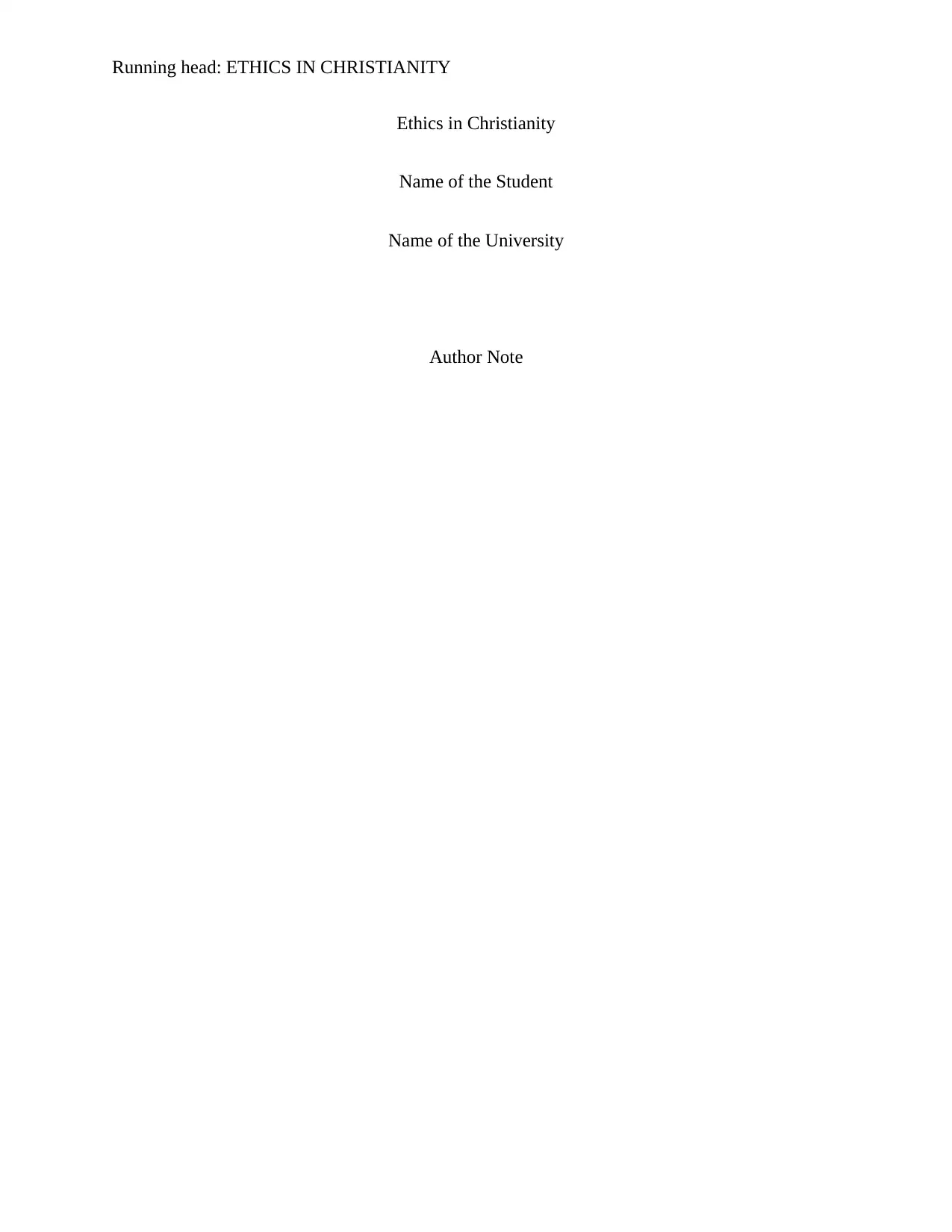
Running head: ETHICS IN CHRISTIANITY
Ethics in Christianity
Name of the Student
Name of the University
Author Note
Ethics in Christianity
Name of the Student
Name of the University
Author Note
Paraphrase This Document
Need a fresh take? Get an instant paraphrase of this document with our AI Paraphraser
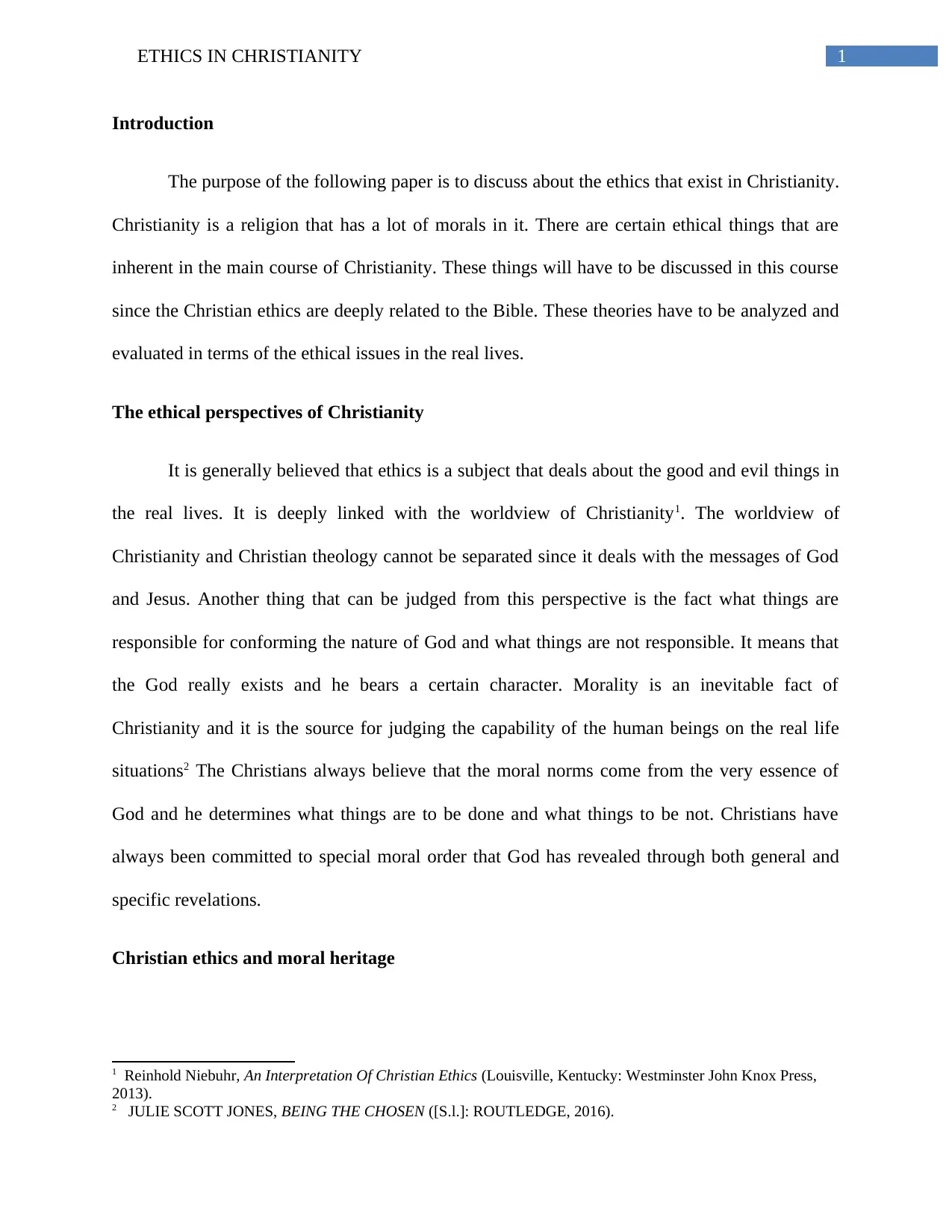
1ETHICS IN CHRISTIANITY
Introduction
The purpose of the following paper is to discuss about the ethics that exist in Christianity.
Christianity is a religion that has a lot of morals in it. There are certain ethical things that are
inherent in the main course of Christianity. These things will have to be discussed in this course
since the Christian ethics are deeply related to the Bible. These theories have to be analyzed and
evaluated in terms of the ethical issues in the real lives.
The ethical perspectives of Christianity
It is generally believed that ethics is a subject that deals about the good and evil things in
the real lives. It is deeply linked with the worldview of Christianity1. The worldview of
Christianity and Christian theology cannot be separated since it deals with the messages of God
and Jesus. Another thing that can be judged from this perspective is the fact what things are
responsible for conforming the nature of God and what things are not responsible. It means that
the God really exists and he bears a certain character. Morality is an inevitable fact of
Christianity and it is the source for judging the capability of the human beings on the real life
situations2 The Christians always believe that the moral norms come from the very essence of
God and he determines what things are to be done and what things to be not. Christians have
always been committed to special moral order that God has revealed through both general and
specific revelations.
Christian ethics and moral heritage
1 Reinhold Niebuhr, An Interpretation Of Christian Ethics (Louisville, Kentucky: Westminster John Knox Press,
2013).
2 JULIE SCOTT JONES, BEING THE CHOSEN ([S.l.]: ROUTLEDGE, 2016).
Introduction
The purpose of the following paper is to discuss about the ethics that exist in Christianity.
Christianity is a religion that has a lot of morals in it. There are certain ethical things that are
inherent in the main course of Christianity. These things will have to be discussed in this course
since the Christian ethics are deeply related to the Bible. These theories have to be analyzed and
evaluated in terms of the ethical issues in the real lives.
The ethical perspectives of Christianity
It is generally believed that ethics is a subject that deals about the good and evil things in
the real lives. It is deeply linked with the worldview of Christianity1. The worldview of
Christianity and Christian theology cannot be separated since it deals with the messages of God
and Jesus. Another thing that can be judged from this perspective is the fact what things are
responsible for conforming the nature of God and what things are not responsible. It means that
the God really exists and he bears a certain character. Morality is an inevitable fact of
Christianity and it is the source for judging the capability of the human beings on the real life
situations2 The Christians always believe that the moral norms come from the very essence of
God and he determines what things are to be done and what things to be not. Christians have
always been committed to special moral order that God has revealed through both general and
specific revelations.
Christian ethics and moral heritage
1 Reinhold Niebuhr, An Interpretation Of Christian Ethics (Louisville, Kentucky: Westminster John Knox Press,
2013).
2 JULIE SCOTT JONES, BEING THE CHOSEN ([S.l.]: ROUTLEDGE, 2016).
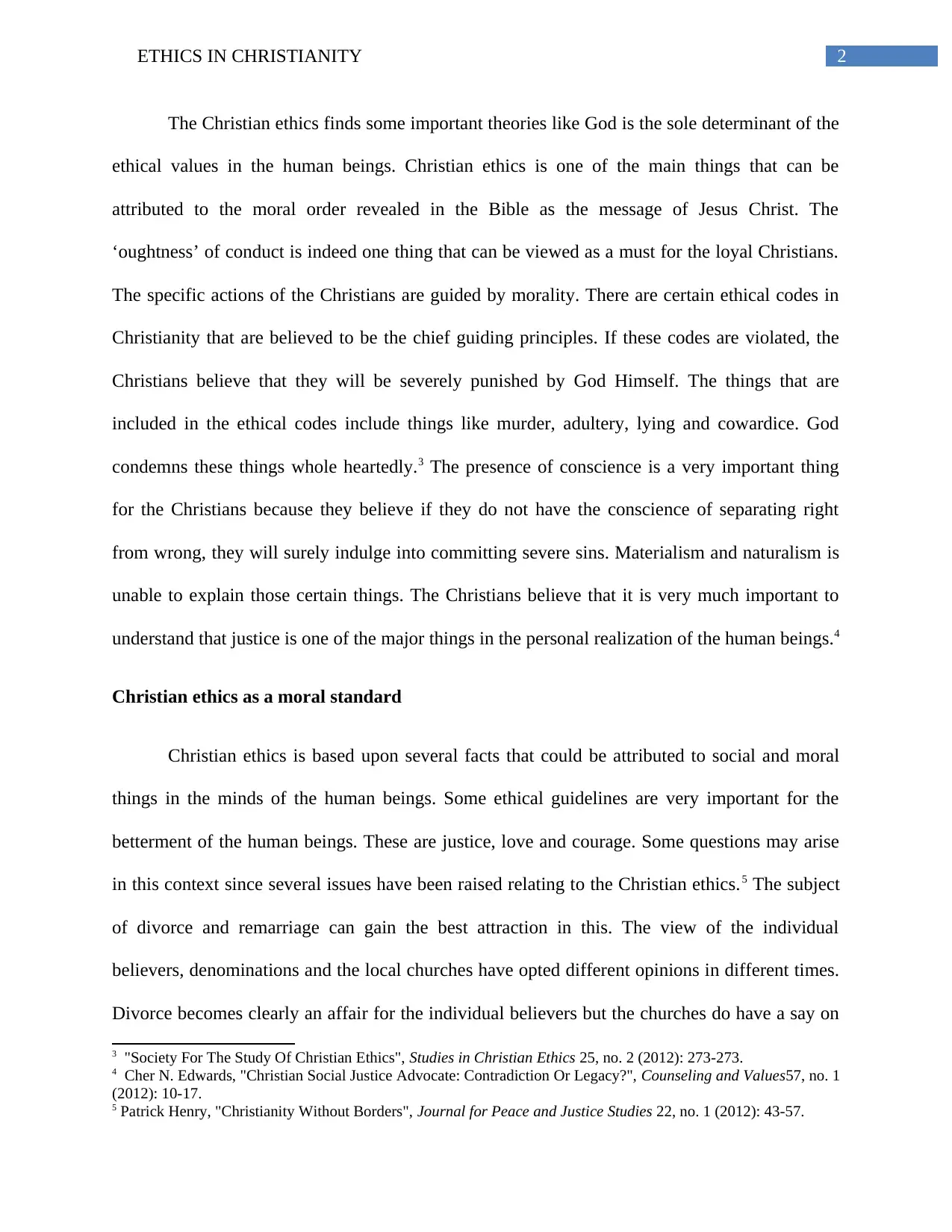
2ETHICS IN CHRISTIANITY
The Christian ethics finds some important theories like God is the sole determinant of the
ethical values in the human beings. Christian ethics is one of the main things that can be
attributed to the moral order revealed in the Bible as the message of Jesus Christ. The
‘oughtness’ of conduct is indeed one thing that can be viewed as a must for the loyal Christians.
The specific actions of the Christians are guided by morality. There are certain ethical codes in
Christianity that are believed to be the chief guiding principles. If these codes are violated, the
Christians believe that they will be severely punished by God Himself. The things that are
included in the ethical codes include things like murder, adultery, lying and cowardice. God
condemns these things whole heartedly.3 The presence of conscience is a very important thing
for the Christians because they believe if they do not have the conscience of separating right
from wrong, they will surely indulge into committing severe sins. Materialism and naturalism is
unable to explain those certain things. The Christians believe that it is very much important to
understand that justice is one of the major things in the personal realization of the human beings.4
Christian ethics as a moral standard
Christian ethics is based upon several facts that could be attributed to social and moral
things in the minds of the human beings. Some ethical guidelines are very important for the
betterment of the human beings. These are justice, love and courage. Some questions may arise
in this context since several issues have been raised relating to the Christian ethics.5 The subject
of divorce and remarriage can gain the best attraction in this. The view of the individual
believers, denominations and the local churches have opted different opinions in different times.
Divorce becomes clearly an affair for the individual believers but the churches do have a say on
3 "Society For The Study Of Christian Ethics", Studies in Christian Ethics 25, no. 2 (2012): 273-273.
4 Cher N. Edwards, "Christian Social Justice Advocate: Contradiction Or Legacy?", Counseling and Values57, no. 1
(2012): 10-17.
5 Patrick Henry, "Christianity Without Borders", Journal for Peace and Justice Studies 22, no. 1 (2012): 43-57.
The Christian ethics finds some important theories like God is the sole determinant of the
ethical values in the human beings. Christian ethics is one of the main things that can be
attributed to the moral order revealed in the Bible as the message of Jesus Christ. The
‘oughtness’ of conduct is indeed one thing that can be viewed as a must for the loyal Christians.
The specific actions of the Christians are guided by morality. There are certain ethical codes in
Christianity that are believed to be the chief guiding principles. If these codes are violated, the
Christians believe that they will be severely punished by God Himself. The things that are
included in the ethical codes include things like murder, adultery, lying and cowardice. God
condemns these things whole heartedly.3 The presence of conscience is a very important thing
for the Christians because they believe if they do not have the conscience of separating right
from wrong, they will surely indulge into committing severe sins. Materialism and naturalism is
unable to explain those certain things. The Christians believe that it is very much important to
understand that justice is one of the major things in the personal realization of the human beings.4
Christian ethics as a moral standard
Christian ethics is based upon several facts that could be attributed to social and moral
things in the minds of the human beings. Some ethical guidelines are very important for the
betterment of the human beings. These are justice, love and courage. Some questions may arise
in this context since several issues have been raised relating to the Christian ethics.5 The subject
of divorce and remarriage can gain the best attraction in this. The view of the individual
believers, denominations and the local churches have opted different opinions in different times.
Divorce becomes clearly an affair for the individual believers but the churches do have a say on
3 "Society For The Study Of Christian Ethics", Studies in Christian Ethics 25, no. 2 (2012): 273-273.
4 Cher N. Edwards, "Christian Social Justice Advocate: Contradiction Or Legacy?", Counseling and Values57, no. 1
(2012): 10-17.
5 Patrick Henry, "Christianity Without Borders", Journal for Peace and Justice Studies 22, no. 1 (2012): 43-57.
⊘ This is a preview!⊘
Do you want full access?
Subscribe today to unlock all pages.

Trusted by 1+ million students worldwide
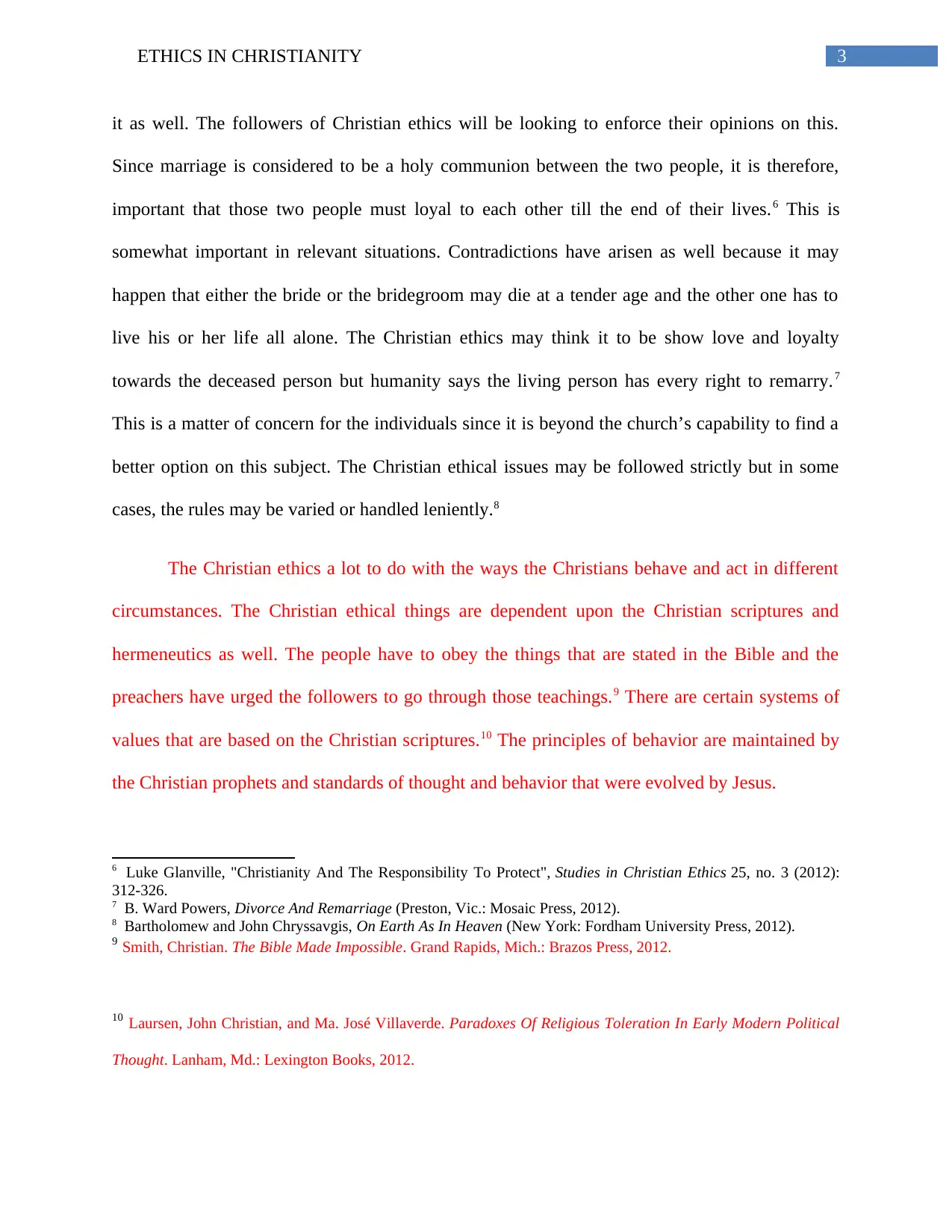
3ETHICS IN CHRISTIANITY
it as well. The followers of Christian ethics will be looking to enforce their opinions on this.
Since marriage is considered to be a holy communion between the two people, it is therefore,
important that those two people must loyal to each other till the end of their lives.6 This is
somewhat important in relevant situations. Contradictions have arisen as well because it may
happen that either the bride or the bridegroom may die at a tender age and the other one has to
live his or her life all alone. The Christian ethics may think it to be show love and loyalty
towards the deceased person but humanity says the living person has every right to remarry.7
This is a matter of concern for the individuals since it is beyond the church’s capability to find a
better option on this subject. The Christian ethical issues may be followed strictly but in some
cases, the rules may be varied or handled leniently.8
The Christian ethics a lot to do with the ways the Christians behave and act in different
circumstances. The Christian ethical things are dependent upon the Christian scriptures and
hermeneutics as well. The people have to obey the things that are stated in the Bible and the
preachers have urged the followers to go through those teachings.9 There are certain systems of
values that are based on the Christian scriptures.10 The principles of behavior are maintained by
the Christian prophets and standards of thought and behavior that were evolved by Jesus.
6 Luke Glanville, "Christianity And The Responsibility To Protect", Studies in Christian Ethics 25, no. 3 (2012):
312-326.
7 B. Ward Powers, Divorce And Remarriage (Preston, Vic.: Mosaic Press, 2012).
8 Bartholomew and John Chryssavgis, On Earth As In Heaven (New York: Fordham University Press, 2012).
9 Smith, Christian. The Bible Made Impossible. Grand Rapids, Mich.: Brazos Press, 2012.
10 Laursen, John Christian, and Ma. José Villaverde. Paradoxes Of Religious Toleration In Early Modern Political
Thought. Lanham, Md.: Lexington Books, 2012.
it as well. The followers of Christian ethics will be looking to enforce their opinions on this.
Since marriage is considered to be a holy communion between the two people, it is therefore,
important that those two people must loyal to each other till the end of their lives.6 This is
somewhat important in relevant situations. Contradictions have arisen as well because it may
happen that either the bride or the bridegroom may die at a tender age and the other one has to
live his or her life all alone. The Christian ethics may think it to be show love and loyalty
towards the deceased person but humanity says the living person has every right to remarry.7
This is a matter of concern for the individuals since it is beyond the church’s capability to find a
better option on this subject. The Christian ethical issues may be followed strictly but in some
cases, the rules may be varied or handled leniently.8
The Christian ethics a lot to do with the ways the Christians behave and act in different
circumstances. The Christian ethical things are dependent upon the Christian scriptures and
hermeneutics as well. The people have to obey the things that are stated in the Bible and the
preachers have urged the followers to go through those teachings.9 There are certain systems of
values that are based on the Christian scriptures.10 The principles of behavior are maintained by
the Christian prophets and standards of thought and behavior that were evolved by Jesus.
6 Luke Glanville, "Christianity And The Responsibility To Protect", Studies in Christian Ethics 25, no. 3 (2012):
312-326.
7 B. Ward Powers, Divorce And Remarriage (Preston, Vic.: Mosaic Press, 2012).
8 Bartholomew and John Chryssavgis, On Earth As In Heaven (New York: Fordham University Press, 2012).
9 Smith, Christian. The Bible Made Impossible. Grand Rapids, Mich.: Brazos Press, 2012.
10 Laursen, John Christian, and Ma. José Villaverde. Paradoxes Of Religious Toleration In Early Modern Political
Thought. Lanham, Md.: Lexington Books, 2012.
Paraphrase This Document
Need a fresh take? Get an instant paraphrase of this document with our AI Paraphraser
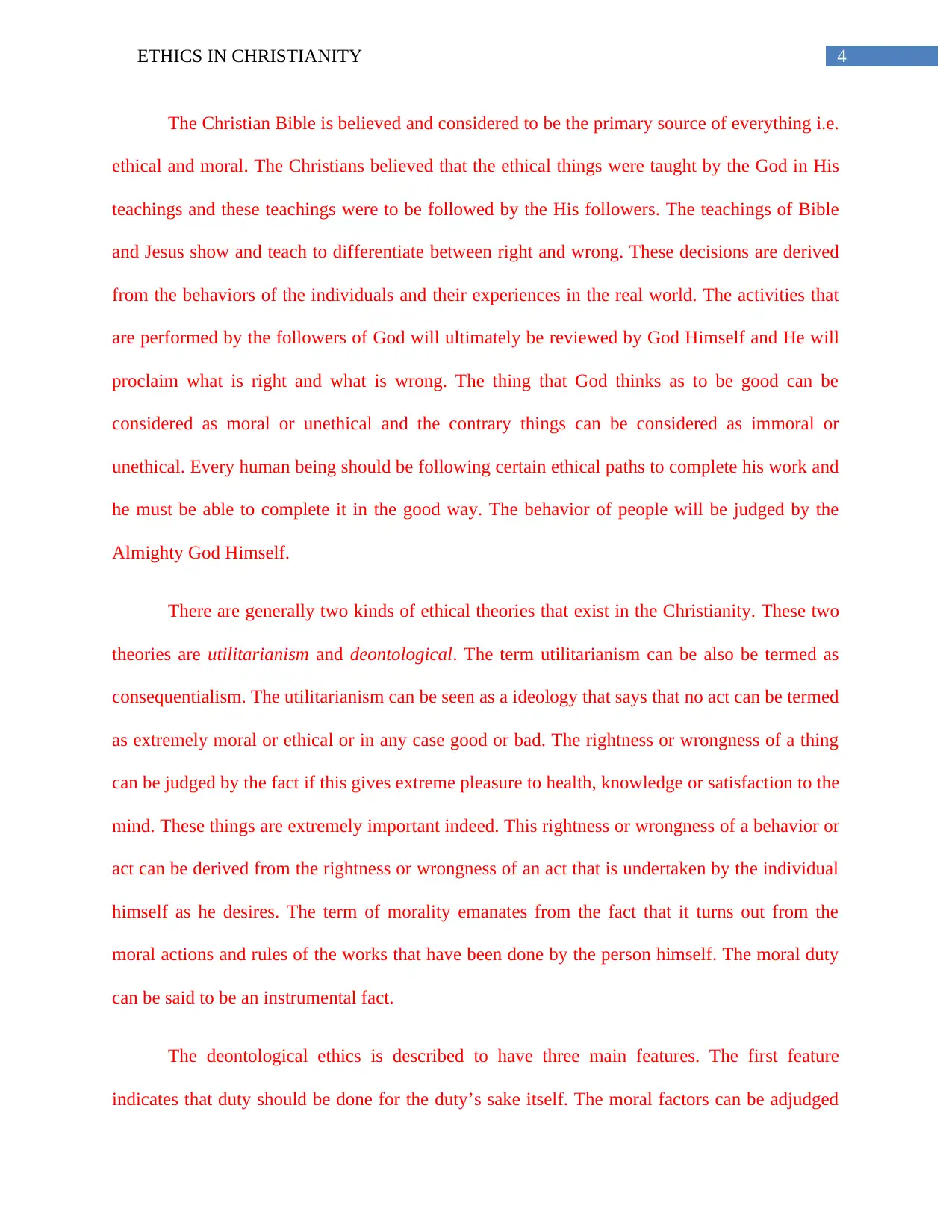
4ETHICS IN CHRISTIANITY
The Christian Bible is believed and considered to be the primary source of everything i.e.
ethical and moral. The Christians believed that the ethical things were taught by the God in His
teachings and these teachings were to be followed by the His followers. The teachings of Bible
and Jesus show and teach to differentiate between right and wrong. These decisions are derived
from the behaviors of the individuals and their experiences in the real world. The activities that
are performed by the followers of God will ultimately be reviewed by God Himself and He will
proclaim what is right and what is wrong. The thing that God thinks as to be good can be
considered as moral or unethical and the contrary things can be considered as immoral or
unethical. Every human being should be following certain ethical paths to complete his work and
he must be able to complete it in the good way. The behavior of people will be judged by the
Almighty God Himself.
There are generally two kinds of ethical theories that exist in the Christianity. These two
theories are utilitarianism and deontological. The term utilitarianism can be also be termed as
consequentialism. The utilitarianism can be seen as a ideology that says that no act can be termed
as extremely moral or ethical or in any case good or bad. The rightness or wrongness of a thing
can be judged by the fact if this gives extreme pleasure to health, knowledge or satisfaction to the
mind. These things are extremely important indeed. This rightness or wrongness of a behavior or
act can be derived from the rightness or wrongness of an act that is undertaken by the individual
himself as he desires. The term of morality emanates from the fact that it turns out from the
moral actions and rules of the works that have been done by the person himself. The moral duty
can be said to be an instrumental fact.
The deontological ethics is described to have three main features. The first feature
indicates that duty should be done for the duty’s sake itself. The moral factors can be adjudged
The Christian Bible is believed and considered to be the primary source of everything i.e.
ethical and moral. The Christians believed that the ethical things were taught by the God in His
teachings and these teachings were to be followed by the His followers. The teachings of Bible
and Jesus show and teach to differentiate between right and wrong. These decisions are derived
from the behaviors of the individuals and their experiences in the real world. The activities that
are performed by the followers of God will ultimately be reviewed by God Himself and He will
proclaim what is right and what is wrong. The thing that God thinks as to be good can be
considered as moral or unethical and the contrary things can be considered as immoral or
unethical. Every human being should be following certain ethical paths to complete his work and
he must be able to complete it in the good way. The behavior of people will be judged by the
Almighty God Himself.
There are generally two kinds of ethical theories that exist in the Christianity. These two
theories are utilitarianism and deontological. The term utilitarianism can be also be termed as
consequentialism. The utilitarianism can be seen as a ideology that says that no act can be termed
as extremely moral or ethical or in any case good or bad. The rightness or wrongness of a thing
can be judged by the fact if this gives extreme pleasure to health, knowledge or satisfaction to the
mind. These things are extremely important indeed. This rightness or wrongness of a behavior or
act can be derived from the rightness or wrongness of an act that is undertaken by the individual
himself as he desires. The term of morality emanates from the fact that it turns out from the
moral actions and rules of the works that have been done by the person himself. The moral duty
can be said to be an instrumental fact.
The deontological ethics is described to have three main features. The first feature
indicates that duty should be done for the duty’s sake itself. The moral factors can be adjudged
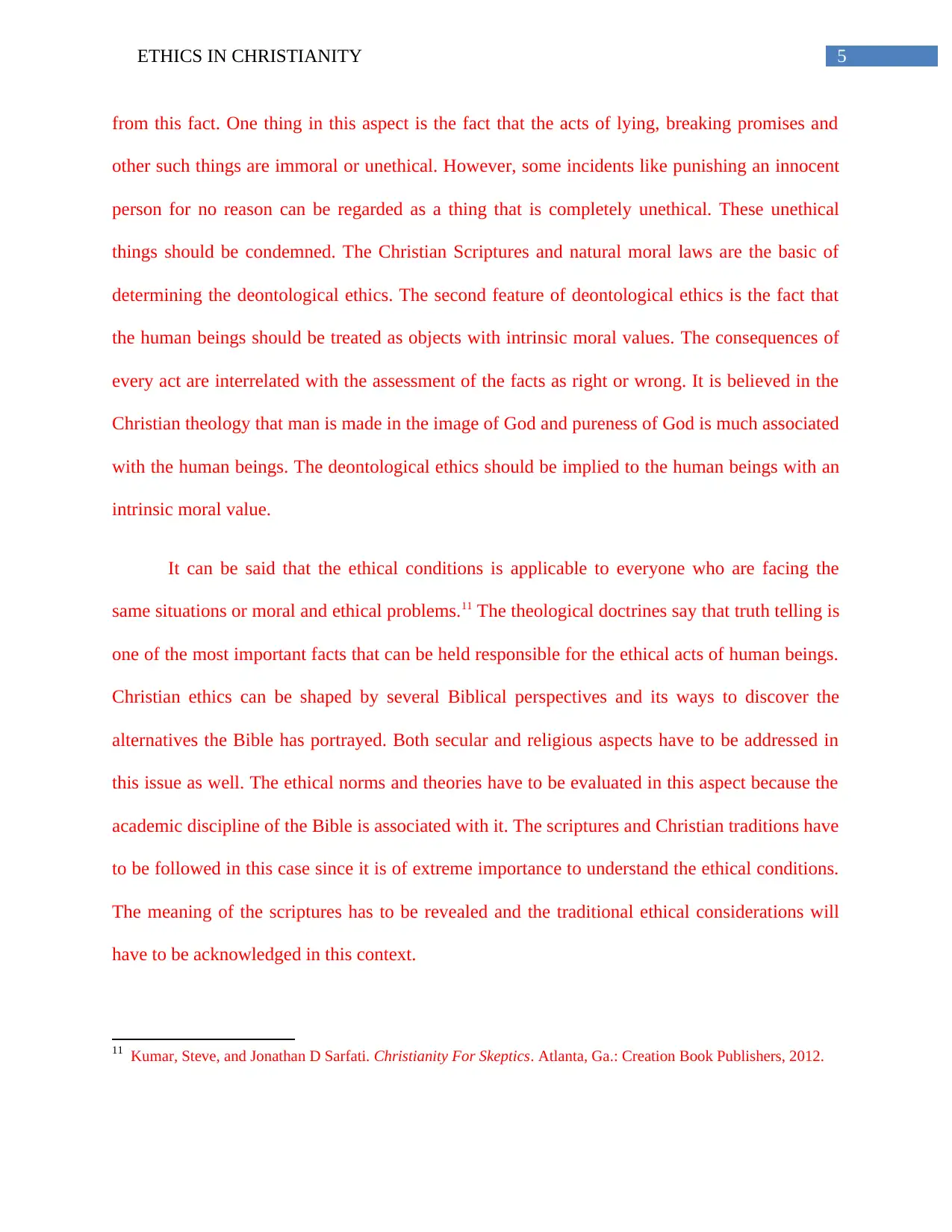
5ETHICS IN CHRISTIANITY
from this fact. One thing in this aspect is the fact that the acts of lying, breaking promises and
other such things are immoral or unethical. However, some incidents like punishing an innocent
person for no reason can be regarded as a thing that is completely unethical. These unethical
things should be condemned. The Christian Scriptures and natural moral laws are the basic of
determining the deontological ethics. The second feature of deontological ethics is the fact that
the human beings should be treated as objects with intrinsic moral values. The consequences of
every act are interrelated with the assessment of the facts as right or wrong. It is believed in the
Christian theology that man is made in the image of God and pureness of God is much associated
with the human beings. The deontological ethics should be implied to the human beings with an
intrinsic moral value.
It can be said that the ethical conditions is applicable to everyone who are facing the
same situations or moral and ethical problems.11 The theological doctrines say that truth telling is
one of the most important facts that can be held responsible for the ethical acts of human beings.
Christian ethics can be shaped by several Biblical perspectives and its ways to discover the
alternatives the Bible has portrayed. Both secular and religious aspects have to be addressed in
this issue as well. The ethical norms and theories have to be evaluated in this aspect because the
academic discipline of the Bible is associated with it. The scriptures and Christian traditions have
to be followed in this case since it is of extreme importance to understand the ethical conditions.
The meaning of the scriptures has to be revealed and the traditional ethical considerations will
have to be acknowledged in this context.
11 Kumar, Steve, and Jonathan D Sarfati. Christianity For Skeptics. Atlanta, Ga.: Creation Book Publishers, 2012.
from this fact. One thing in this aspect is the fact that the acts of lying, breaking promises and
other such things are immoral or unethical. However, some incidents like punishing an innocent
person for no reason can be regarded as a thing that is completely unethical. These unethical
things should be condemned. The Christian Scriptures and natural moral laws are the basic of
determining the deontological ethics. The second feature of deontological ethics is the fact that
the human beings should be treated as objects with intrinsic moral values. The consequences of
every act are interrelated with the assessment of the facts as right or wrong. It is believed in the
Christian theology that man is made in the image of God and pureness of God is much associated
with the human beings. The deontological ethics should be implied to the human beings with an
intrinsic moral value.
It can be said that the ethical conditions is applicable to everyone who are facing the
same situations or moral and ethical problems.11 The theological doctrines say that truth telling is
one of the most important facts that can be held responsible for the ethical acts of human beings.
Christian ethics can be shaped by several Biblical perspectives and its ways to discover the
alternatives the Bible has portrayed. Both secular and religious aspects have to be addressed in
this issue as well. The ethical norms and theories have to be evaluated in this aspect because the
academic discipline of the Bible is associated with it. The scriptures and Christian traditions have
to be followed in this case since it is of extreme importance to understand the ethical conditions.
The meaning of the scriptures has to be revealed and the traditional ethical considerations will
have to be acknowledged in this context.
11 Kumar, Steve, and Jonathan D Sarfati. Christianity For Skeptics. Atlanta, Ga.: Creation Book Publishers, 2012.
⊘ This is a preview!⊘
Do you want full access?
Subscribe today to unlock all pages.

Trusted by 1+ million students worldwide
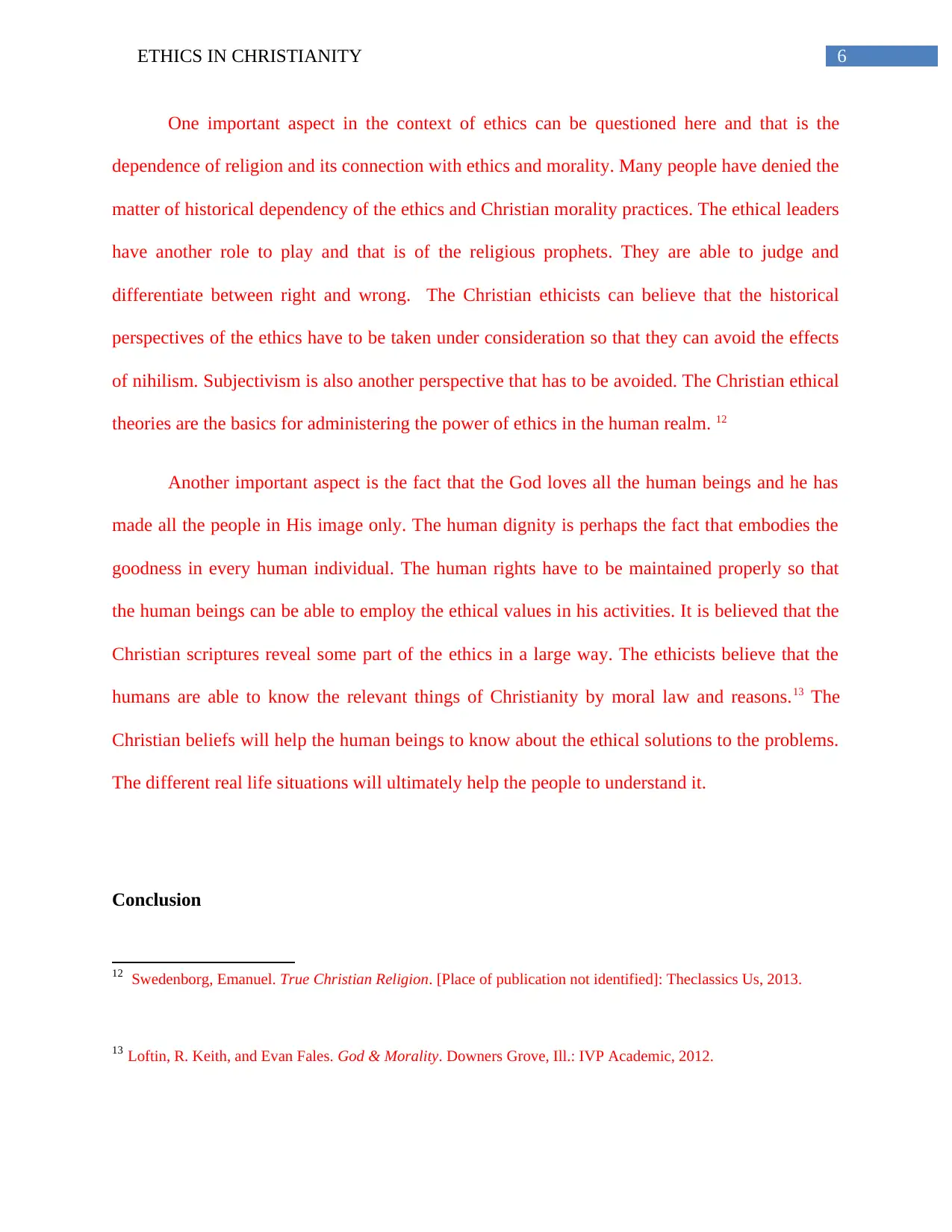
6ETHICS IN CHRISTIANITY
One important aspect in the context of ethics can be questioned here and that is the
dependence of religion and its connection with ethics and morality. Many people have denied the
matter of historical dependency of the ethics and Christian morality practices. The ethical leaders
have another role to play and that is of the religious prophets. They are able to judge and
differentiate between right and wrong. The Christian ethicists can believe that the historical
perspectives of the ethics have to be taken under consideration so that they can avoid the effects
of nihilism. Subjectivism is also another perspective that has to be avoided. The Christian ethical
theories are the basics for administering the power of ethics in the human realm. 12
Another important aspect is the fact that the God loves all the human beings and he has
made all the people in His image only. The human dignity is perhaps the fact that embodies the
goodness in every human individual. The human rights have to be maintained properly so that
the human beings can be able to employ the ethical values in his activities. It is believed that the
Christian scriptures reveal some part of the ethics in a large way. The ethicists believe that the
humans are able to know the relevant things of Christianity by moral law and reasons.13 The
Christian beliefs will help the human beings to know about the ethical solutions to the problems.
The different real life situations will ultimately help the people to understand it.
Conclusion
12 Swedenborg, Emanuel. True Christian Religion. [Place of publication not identified]: Theclassics Us, 2013.
13 Loftin, R. Keith, and Evan Fales. God & Morality. Downers Grove, Ill.: IVP Academic, 2012.
One important aspect in the context of ethics can be questioned here and that is the
dependence of religion and its connection with ethics and morality. Many people have denied the
matter of historical dependency of the ethics and Christian morality practices. The ethical leaders
have another role to play and that is of the religious prophets. They are able to judge and
differentiate between right and wrong. The Christian ethicists can believe that the historical
perspectives of the ethics have to be taken under consideration so that they can avoid the effects
of nihilism. Subjectivism is also another perspective that has to be avoided. The Christian ethical
theories are the basics for administering the power of ethics in the human realm. 12
Another important aspect is the fact that the God loves all the human beings and he has
made all the people in His image only. The human dignity is perhaps the fact that embodies the
goodness in every human individual. The human rights have to be maintained properly so that
the human beings can be able to employ the ethical values in his activities. It is believed that the
Christian scriptures reveal some part of the ethics in a large way. The ethicists believe that the
humans are able to know the relevant things of Christianity by moral law and reasons.13 The
Christian beliefs will help the human beings to know about the ethical solutions to the problems.
The different real life situations will ultimately help the people to understand it.
Conclusion
12 Swedenborg, Emanuel. True Christian Religion. [Place of publication not identified]: Theclassics Us, 2013.
13 Loftin, R. Keith, and Evan Fales. God & Morality. Downers Grove, Ill.: IVP Academic, 2012.
Paraphrase This Document
Need a fresh take? Get an instant paraphrase of this document with our AI Paraphraser
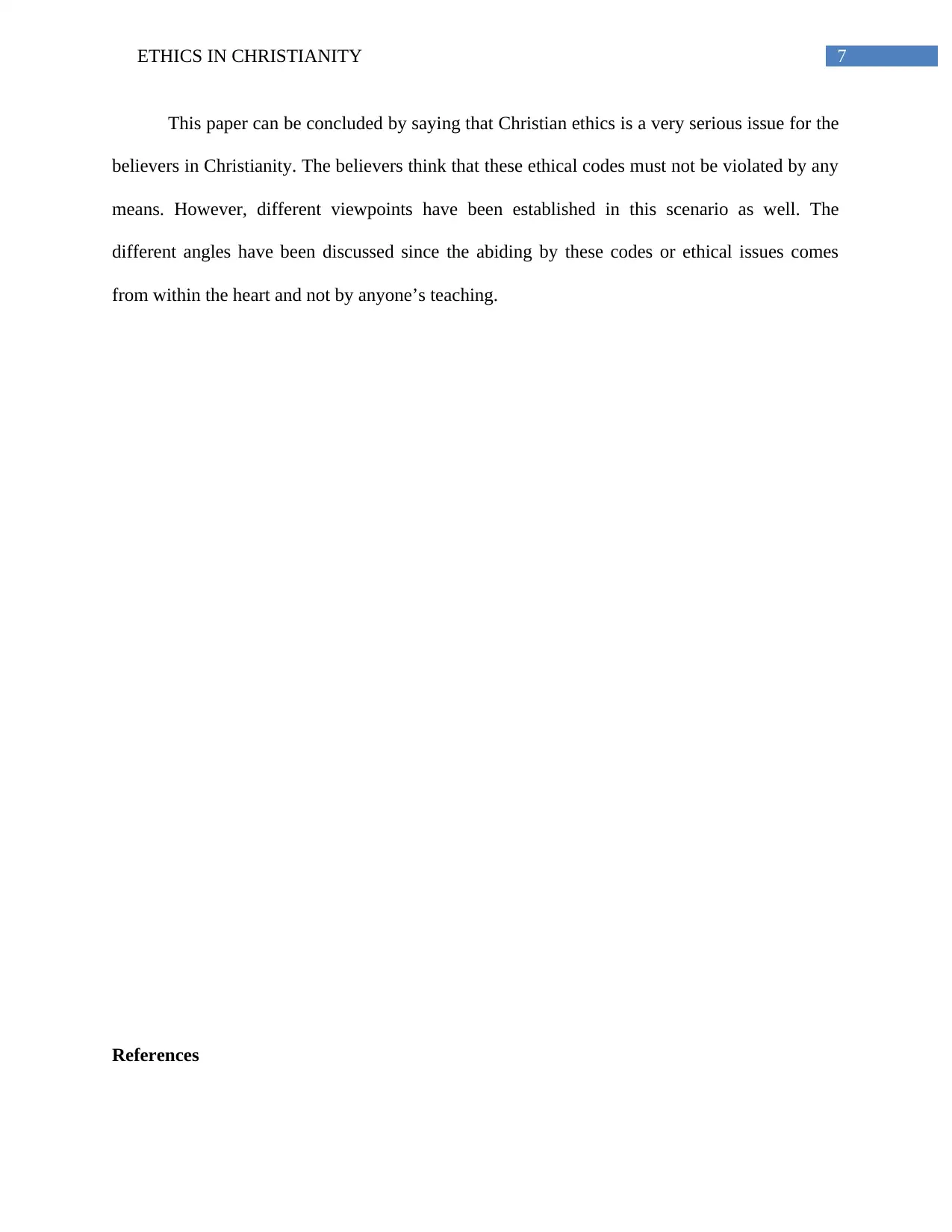
7ETHICS IN CHRISTIANITY
This paper can be concluded by saying that Christian ethics is a very serious issue for the
believers in Christianity. The believers think that these ethical codes must not be violated by any
means. However, different viewpoints have been established in this scenario as well. The
different angles have been discussed since the abiding by these codes or ethical issues comes
from within the heart and not by anyone’s teaching.
References
This paper can be concluded by saying that Christian ethics is a very serious issue for the
believers in Christianity. The believers think that these ethical codes must not be violated by any
means. However, different viewpoints have been established in this scenario as well. The
different angles have been discussed since the abiding by these codes or ethical issues comes
from within the heart and not by anyone’s teaching.
References
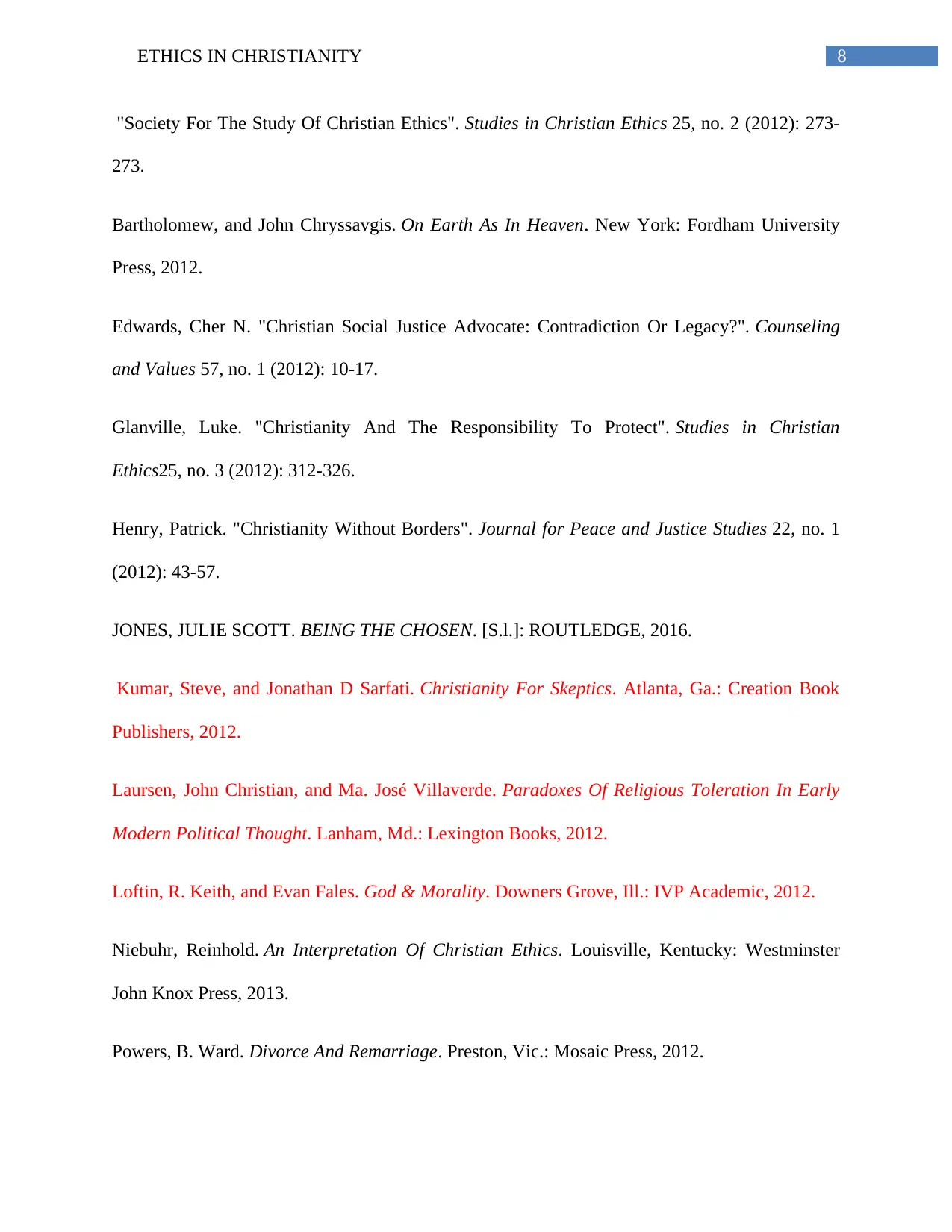
8ETHICS IN CHRISTIANITY
"Society For The Study Of Christian Ethics". Studies in Christian Ethics 25, no. 2 (2012): 273-
273.
Bartholomew, and John Chryssavgis. On Earth As In Heaven. New York: Fordham University
Press, 2012.
Edwards, Cher N. "Christian Social Justice Advocate: Contradiction Or Legacy?". Counseling
and Values 57, no. 1 (2012): 10-17.
Glanville, Luke. "Christianity And The Responsibility To Protect". Studies in Christian
Ethics25, no. 3 (2012): 312-326.
Henry, Patrick. "Christianity Without Borders". Journal for Peace and Justice Studies 22, no. 1
(2012): 43-57.
JONES, JULIE SCOTT. BEING THE CHOSEN. [S.l.]: ROUTLEDGE, 2016.
Kumar, Steve, and Jonathan D Sarfati. Christianity For Skeptics. Atlanta, Ga.: Creation Book
Publishers, 2012.
Laursen, John Christian, and Ma. José Villaverde. Paradoxes Of Religious Toleration In Early
Modern Political Thought. Lanham, Md.: Lexington Books, 2012.
Loftin, R. Keith, and Evan Fales. God & Morality. Downers Grove, Ill.: IVP Academic, 2012.
Niebuhr, Reinhold. An Interpretation Of Christian Ethics. Louisville, Kentucky: Westminster
John Knox Press, 2013.
Powers, B. Ward. Divorce And Remarriage. Preston, Vic.: Mosaic Press, 2012.
"Society For The Study Of Christian Ethics". Studies in Christian Ethics 25, no. 2 (2012): 273-
273.
Bartholomew, and John Chryssavgis. On Earth As In Heaven. New York: Fordham University
Press, 2012.
Edwards, Cher N. "Christian Social Justice Advocate: Contradiction Or Legacy?". Counseling
and Values 57, no. 1 (2012): 10-17.
Glanville, Luke. "Christianity And The Responsibility To Protect". Studies in Christian
Ethics25, no. 3 (2012): 312-326.
Henry, Patrick. "Christianity Without Borders". Journal for Peace and Justice Studies 22, no. 1
(2012): 43-57.
JONES, JULIE SCOTT. BEING THE CHOSEN. [S.l.]: ROUTLEDGE, 2016.
Kumar, Steve, and Jonathan D Sarfati. Christianity For Skeptics. Atlanta, Ga.: Creation Book
Publishers, 2012.
Laursen, John Christian, and Ma. José Villaverde. Paradoxes Of Religious Toleration In Early
Modern Political Thought. Lanham, Md.: Lexington Books, 2012.
Loftin, R. Keith, and Evan Fales. God & Morality. Downers Grove, Ill.: IVP Academic, 2012.
Niebuhr, Reinhold. An Interpretation Of Christian Ethics. Louisville, Kentucky: Westminster
John Knox Press, 2013.
Powers, B. Ward. Divorce And Remarriage. Preston, Vic.: Mosaic Press, 2012.
⊘ This is a preview!⊘
Do you want full access?
Subscribe today to unlock all pages.

Trusted by 1+ million students worldwide
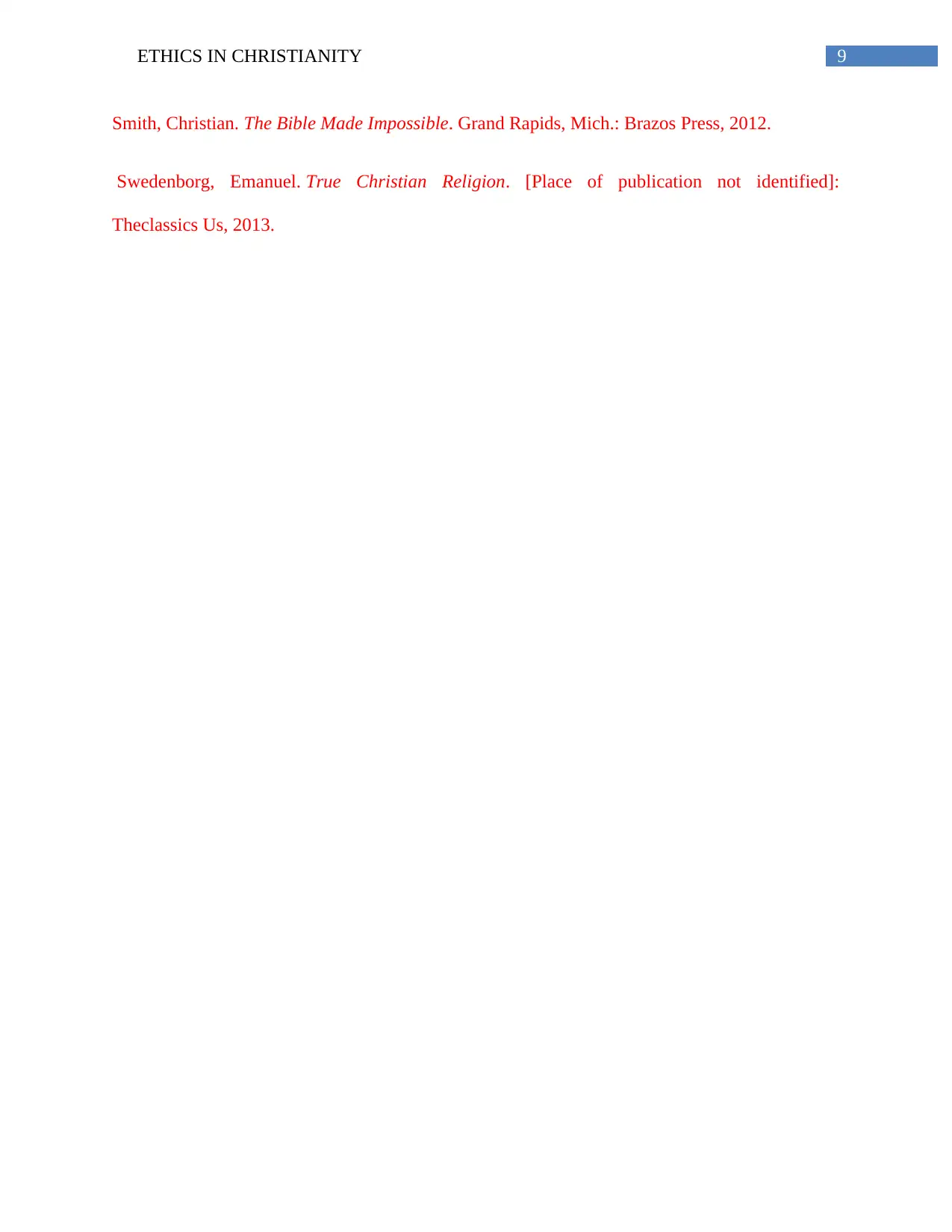
9ETHICS IN CHRISTIANITY
Smith, Christian. The Bible Made Impossible. Grand Rapids, Mich.: Brazos Press, 2012.
Swedenborg, Emanuel. True Christian Religion. [Place of publication not identified]:
Theclassics Us, 2013.
Smith, Christian. The Bible Made Impossible. Grand Rapids, Mich.: Brazos Press, 2012.
Swedenborg, Emanuel. True Christian Religion. [Place of publication not identified]:
Theclassics Us, 2013.
1 out of 10
Related Documents
Your All-in-One AI-Powered Toolkit for Academic Success.
+13062052269
info@desklib.com
Available 24*7 on WhatsApp / Email
![[object Object]](/_next/static/media/star-bottom.7253800d.svg)
Unlock your academic potential
Copyright © 2020–2026 A2Z Services. All Rights Reserved. Developed and managed by ZUCOL.




